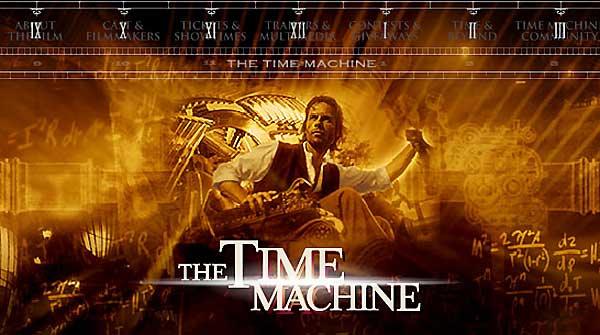The Time Machine (2002)

The Time Machine (2002), directed by Simon Wells, is a science fiction film that brings H.G. Wells’ classic novel of the same name to the screen. With a screenplay adapted by John Logan, the film features a cast led by Guy Pearce, and includes notable performances from Samantha Mumba, Mark Addy, and Jeremy Irons. This essay examines the film’s plot, thematic elements, character development, stylistic approach, and its impact on the science fiction genre.
The film is set in the late 19th century and follows Alexander Hartdegen (Guy Pearce), a brilliant inventor and scientist who is deeply motivated by the tragic loss of his fiancée, Emma (Samantha Mumba). Distraught by her death, Alexander creates a time machine with the hope of altering the past and preventing her murder. When his efforts prove futile, he shifts his focus to exploring the future. His journey takes him through various epochs, from the near future to the distant year of 802,701 AD, where he discovers a world divided between the peaceful Eloi and the sinister Morlocks. As Alexander navigates this future world, he encounters new challenges and uncovers deeper truths about humanity’s evolution and the nature of progress.
The Time Machine explores several themes central to science fiction and speculative fiction. One prominent theme is the impact of technology on human progress and society. Alexander’s invention reflects humanity’s desire to transcend temporal limitations and the consequences of playing god with technology. The film also delves into themes of loss and redemption, as Alexander’s quest is driven by his grief over Emma’s death and his desire to find closure. Additionally, the movie presents a critique of societal evolution, depicting a future where class divisions and human values have drastically shifted, highlighting both the potential for progress and the risks of stagnation.
Guy Pearce’s portrayal of Alexander Hartdegen is pivotal to the film’s narrative. Pearce effectively conveys Alexander’s transformation from a grief-stricken inventor to a determined explorer of time. The character’s evolution is driven by his emotional journey and intellectual curiosity, making him a compelling protagonist. Samantha Mumba’s role as Emma serves as a catalyst for Alexander’s actions, although her screen time is limited, her impact is significant. The characters of the Eloi and Morlocks, played by various actors including Jeremy Irons as the enigmatic leader of the Morlocks, add depth to the depiction of future societies. The contrasting nature of these groups illustrates the divergent paths humanity might take, enriching the film’s thematic exploration.

Simon Wells employs a range of visual and narrative techniques to bring the time-traveling adventure to life. The film’s special effects and set designs effectively create distinct and immersive worlds, from the Victorian-era setting to the futuristic landscapes. The time machine itself is depicted with intricate detail, reflecting Alexander’s genius and the film’s steampunk aesthetic. The use of CGI and practical effects blends seamlessly to visualize the different time periods and the dramatic changes in the future world. The film’s pacing balances action with introspection, ensuring that the audience remains engaged with both the spectacle and the underlying emotional themes.

The Time Machine contributes to the science fiction genre by exploring classic themes of time travel and human evolution within a visually dynamic framework. While the film received mixed reviews from critics, it is notable for its attempt to modernize and adapt a literary classic for contemporary audiences. Its portrayal of futuristic societies and the implications of technological advancement reflects ongoing debates within science fiction about the relationship between humanity and its creations. The film also adds to the tradition of time travel narratives, providing a fresh perspective on the consequences and possibilities of altering time.

The Time Machine (2002) is a visually captivating and thematically rich adaptation of H.G. Wells’ seminal work. Directed by Simon Wells, the film explores complex themes of technology, loss, and societal evolution through the journey of Alexander Hartdegen. The film’s stylistic approach, combined with its character development and narrative structure, offers a compelling exploration of time travel and its implications. Despite its mixed critical reception, The Time Machine remains a significant entry in the science fiction genre, reflecting both the enduring relevance of Wells’ ideas and the genre’s capacity for imaginative storytelling.










